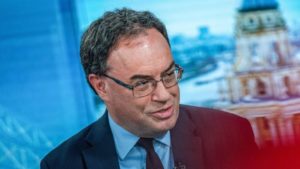The Bank of England will not hesitate to intervene “aggressively” if a new spike in infections hits the economy, the governor has said.
Teeing up the possibility of another round of quantitative easing next month, Andrew Bailey said the central bank stood ready to respond to what “certainly looks like a second wave” of Covid 19.
“We must use policy actively and aggressively, and we have done that,” Mr Bailey told a European Union banking conference. “We are by no means out of firepower and we will use that firepower properly and strongly in response to second and third waves where we feel it is necessary.
“There is an unprecedented level of uncertainty at the moment. And the risks, I’m afraid are very much on the downside.”
In an earlier interview with The Yorkshire Post newspaper, he said: “The policy tools will be used to the fullest extent possible to support the businesses and people of this country.”
After the pandemic hit the UK in March the Bank cut rates to 0.1 per cent, launched £300 billion more quantitative easing, flooded the banking system with liquidity and relaxed financial regulations.
Economists expect another £100 billion of quantitative easing when the Bank updates its forecasts next month. Officials have also said the present rate of gilt purchases could be accelerated. It was buying £13.5 billion a week in April, but cut that to £4.5 billion.
Addressing a webinar held by EU’s Single Resolution Board, Mr Bailey urged commercial banks to keep lending even if it meant running closer to their regulatory capital limits.
“I understand there is a natural unease to do that. Given the history of this, given the financial crisis, it’s a brave person who says yes, I am going to run my capital ratio down,” he said. “We have to use the stress test to demonstrate that is a realistic and sensible policy.”
At the start of the crisis the Bank said lenders would see fewer defaults if they supported the economy with credit than if they pulled back because withdrawing support could cause a deeper recession.
The governor repeated earlier estimates that the economy was probably between 7 per cent and 10 per cent smaller than its pre-pandemic level, an improvement since April, when it was 25 per cent smaller.
